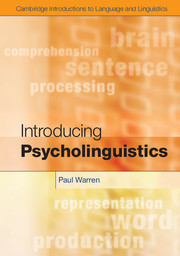Book contents
- Frontmatter
- Contents
- Figures
- Tables
- Preface
- Chapter 1 Introduction
- Chapter 2 Planning utterances
- Chapter 3 Finding words
- Chapter 4 Building words
- Chapter 5 Monitoring and repair
- Chapter 6 The use of gesture
- Chapter 7 Perception for language
- Chapter 8 Spoken word recognition
- Chapter 9 Visual word recognition
- Chapter 10 Syntactic sentence processing
- Chapter 11 Interpreting sentences
- Chapter 12 Making connections
- Chapter 13 Architecture of the language processing system
- Glossary
- References
- Index
Chapter 1 - Introduction
Published online by Cambridge University Press: 05 November 2012
- Frontmatter
- Contents
- Figures
- Tables
- Preface
- Chapter 1 Introduction
- Chapter 2 Planning utterances
- Chapter 3 Finding words
- Chapter 4 Building words
- Chapter 5 Monitoring and repair
- Chapter 6 The use of gesture
- Chapter 7 Perception for language
- Chapter 8 Spoken word recognition
- Chapter 9 Visual word recognition
- Chapter 10 Syntactic sentence processing
- Chapter 11 Interpreting sentences
- Chapter 12 Making connections
- Chapter 13 Architecture of the language processing system
- Glossary
- References
- Index
Summary
PREVIEW
This chapter provides an overview both of the field of psycholinguistics and of the book itself. By the end of the chapter you should have a better understanding of, amongst other things, the appeal, significance and subject matter of psycholinguistics.
Introduction
Although there is little agreement on how many words an adult native speaker of English might know, let us take a conservative estimate of 20,000 (based on Nation, 2006, but see Section 8.2), and let us also assume that splundle is not one of them. Imagine such a native speaker searching through their 20,000-word mental lexicon, as we call the dictionary in our heads. Let’s assume that they do so at a seemingly impressive rate of 100 words per second (which incidentally is 20 times faster than a good reading pace of 300 words per minute). At this rate, if they searched exhaustively through their mental lexicon, it would still take over 3 minutes to confirm that splundle is not there. Yet if you ask someone if they know the word splundle, they will be able to tell you more or less instantly that they do not. Clearly something is wrong with the assumptions we have just made about how rapidly we can look up words in our mental lexicon, or about the way in which we search through it, or both.
- Type
- Chapter
- Information
- Introducing Psycholinguistics , pp. 1 - 12Publisher: Cambridge University PressPrint publication year: 2012



